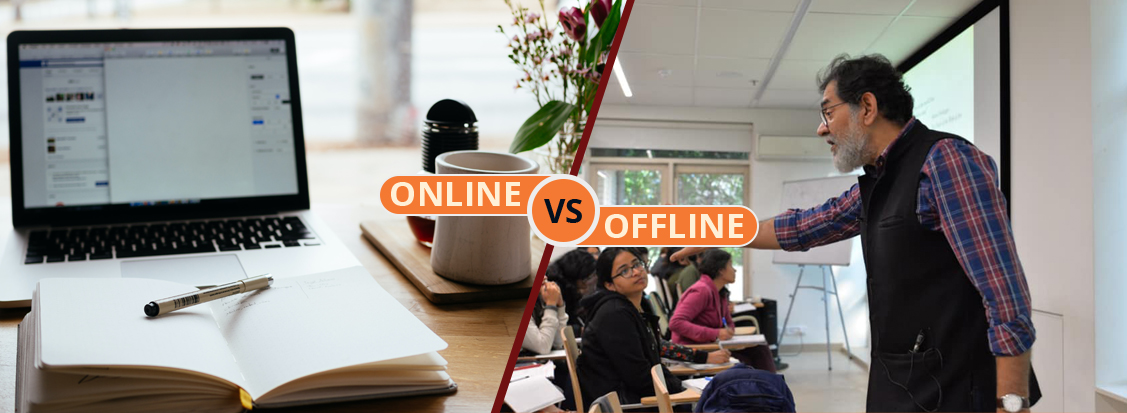Pros & Cons

ONLINE LEARNING - PROS AND CONS
The pandemic has disrupted the higher education industry and almost all postgraduate students are taking their classes online. Although online classes existed before the outbreak of pandemic, the recent situation has resulted in all management students studying, working and interning virtually.
If you’re about to embark on your journey of management education with Vedica, we encourage you to go through the following points, mull over these pros and cons and weigh them with your learning style.
The Pros
Online learning provides flexibility of learning, especially to students who encounter a new subject, allowing them time to improve their understanding outside of class hours. With the multidisciplinary nature of Vedica’s curriculum, regardless of your educational background, you will be facing subjects that you have never encountered before. With support from your TAs, faculty and an immersive culture of peer learning, we’re confident that you can adjust your personal and group study sessions to match the most optimal time for you.
Some students don't feel comfortable raising their voice in an online discussion or classroom. Vedica's online pedagogy also includes the removal of classroom participation as a graded activity, allowing our Scholars to learn independently. This keeps the onus of absorbing and retaining concepts taught in class squarely on the students' shoulders, which they can self-pace.
Engagement with online courses leads to increased fluency with digital tools. This can be fairly handy with more and more organizations working remotely. Familiarity with these tools, coupled with effective communication in a virtual setting and proper organization are all highly desirable traits sought by employers in a post-pandemic workspace.
Vedica's promise of customised attention stays true, regardless of the model of offline or online deployment. Engagement with mentors, one-on-one meetings with the Vedica Writing and Communication Centre, one-on-one engagements with your Shadow mentor and assured placements - all promises stay intact!
Beyond encouraging participation from reluctant students, online assignments can have a multi-modal design (i.e., graphics, text, audio, virtual hands-on activities). This also helps students reach new learning levels or think more deeply or critically about a given concept.
The online ecosystem has given way to paperless assignments, which are a great way to conserve environmental resources.
We've seen many incidents of students with disabilities not being able to cope with a traditional classroom environment. Along with the ability to pace your learning, there are many tools that help create a more inclusive learning environment, including speech to text software for hearing impaired students, automatic transcript or subtitle generation for language preferences and colour-correction on screens to correct for colour blindness. It also accommodates for different student styles and levels
The Cons
Given the nature of the online medium and current circumstances, no educational institute is able to facilitate face-to-face interaction with the faculty for its students. Vedica has taken cognizance of this fact and increased online office-hours with faculty, increased engagement with teaching assistants and fostered a deep culture of peer learning to fill the void that's left behind.
Across students and working professionals, we've all experienced increased screen time. At Vedica we're aware of the strain and fatigue this puts on our students. We've adapted to the increased screen time by reducing the length of the academic day. Class time has been reduced to 4.5 hours per day from its offline counterpart of 6 hours per day.
With no requirements to attend class physically, the responsibility of attending a class, submitting assignments on time and studying for assessments falls on you. This requires good time management skills, self discipline and organizational skills. Our Scholars have mentioned how they have integrated personal hobbies into their workday, while attendance and timely submissions continue to be the norm.
With the internet at your fingertips, classes at Vedica are now less about teaching basics and more about student and faculty discussions of topics assigned beforehand. The culture of pre-reads and pre-work has increased in the digital classroom across universities. If you want to be successful in this environment, you'll have to adapt to this. We've found that learning is now more collaborative, and student led, rather than faculty led. This is more empowering than the latter and requires students to focus on a more application based framework of learning rather than the traditional rote learning system.



